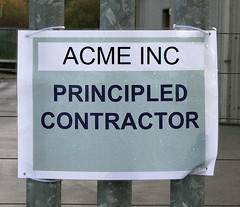'High Road' Contracting: Unprincipled Contractors Need Not Apply
by Gary Therkildsen*, 7/16/2010
Last week in the Los Angeles Times, Berkeley Law School Dean Christopher Edley wrote a compelling op-ed on why President Obama should end the delay and sign an executive order enforcing a new "high road" contracting policy for the federal government. While it's not likely to have the same instant stimulative effects of the Recovery Act, a "high road" contracting policy could, as Edley argues, "do more for the economy than [a] second stimulus measure."
With 14.6 million individuals currently unable to find work in this country, economists and politicians are rightly concerned with fostering job growth. But shouldn't we also be concerned with the quality of jobs being created?

As Edley observes, "It is likely that a large part of the private-sector job growth in this limping recovery will be in industries that pay low wages." Not only do low wage jobs often provide poverty-level earnings, but also individuals in those jobs are more likely to experience exploitation from their employers, like being cheated out of overtime earnings or other basic protections.
Edley, a former policy wonk in both the Carter and Clinton administrations, points to some of the executive orders signed by Presidents Lyndon Johnson, Richard Nixon, and Jimmy Carter that turned federal purchasing power "into an engine for promoting model employment practices," and says the President Obama can do the same thing now.
By promoting higher standards among the government's contracted workforce, not only will workers gain, but taxpayers will as well. While costs might increase initially as the government rewards companies that pay a living wage, health insurance, and other benefits, as Scott Amey over at the Project On Government Oversight (POGO) recently argued on the subject, "[T]here is a growing body of research suggesting that in the long-run, a high-road approach to contracting pays off."
That body of research includes examples like the state of Maryland, which instituted a living wage standard and saw competition increase as "'good' firms that could compete on a level playing field" entered the state's contractor pool. There are others:
In Los Angeles, a study of the city's living wage law found that staff turnover rates at firms covered by the law averaged 17% lower than at firms that weren't. And a leading study of the San Francisco airport by researchers at the University of California found that after the airport boosted wages, turnover among contracted security screeners plummeted from 95% to 19%, service quality improved dramatically, and the airport saved thousands of dollars per worker in new employee recruitment and training costs.
That means happier, more financially secure contract employees that are less likely to require taxpayer-funded government assistance, and higher quality goods and services for the government. With 22 percent of workers in the U.S. employed by a company that does business with the federal government, President Obama can institute positive, wide-ranging, long-term economic effects by mandating a "high road" contracting policy.
Image by Flickr user johnsolid used under a Creative Commons license.



